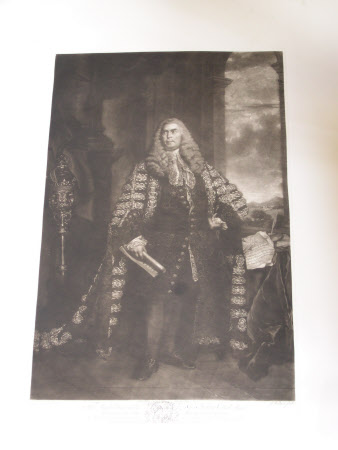The Hon. Sir John Cust, 3rd Bt of Pinchbeck and 6th Bt of Humby (1718-1770) (after Sir Joshua Reynolds PRA)
John Dawson Watson (Sedbergh 1832 - Conwy 1892)
Category
Art / Prints
Date
1769
Materials
Paper
Measurements
620 x 150 mm
Order this imageCollection
Belton House, Lincolnshire
NT 433956
Summary
Print, mezzotint, The Hon. Sir John Cust, 3rd Bt of Pinchbeck and 6th Bt of Humby (1718-1770) (after Sir Joshua Reynolds PRA) by John Dawson Watson (Sedbergh 1832 – Conwy 1892). One of fifteen copies of a mezzotint full-length portrait of Sir John Cust, Speaker of the House of Commons by John Watson after Sir Joshua Reynolds, 1769. One item is mounted on a stretcher, unframed and in poor condition. Shown in his robes as Speaker of the House of Commons (1761-70) and painted just before his re-election to this office. His wig had a sitting all of its own! Cust holds the first Bill he presented to George III for signature, to provide a settlement for Queen Charlotte in the case of the king's death. He died five days after resigning the post from exhaustion, mostly caused by the demagogue John Wilkes. The Rt. Hon. Sir John Cust, 3rd Bt. of Pinchbeck and 6th Bt. of Humby (1718-70) was born on 29 August 1718. He was baptised on 25 September 1718 at St. Martin-in-the-Fields, London. Son of Sir Richard Cust (1680-1734), 2nd Bt. of Pinchbeck and Anne Brownlow (1694-1779). He was educated at Eton College, and succeeded to the title of 3rd Baronet Cust, of Stamford on 25 July 1734. He graduated from Corpus Christi College, Cambridge, in 1739 with an M.A. He was admitted to the Middle Temple on 26 November 1742. Married Etheldred Payne (1720-75) daughter of Thomas Payne and Elizabeth Folkes, on 8 December 1743. He was MP for Grantham 1743-1770. He held the office of Clerk of the Household to Frederick, Prince of Wales 1747-1751, and was Steward of the Household to the Dowager Princess of Wales, 1751, and Clerk of the Household to George Prince of Wales 1751 and 1760. He held the office of Speaker of the House of Commons between 3 November 1761 and 19 January 1770 Father of Sir Brownlow Cust (1744-1807), 7th Bt. of Humby, who was created Baron Brownlow in 1776. The peerage conferred on his son was his posthumous recompense as Speaker. He died on 24 January 1770 at age 51.
Makers and roles
John Dawson Watson (Sedbergh 1832 - Conwy 1892), engraver (printmaker) after Sir Joshua Reynolds PRA (Plympton 1723 - London 1792), artist
